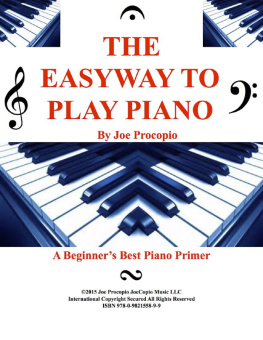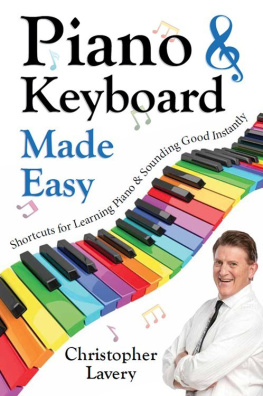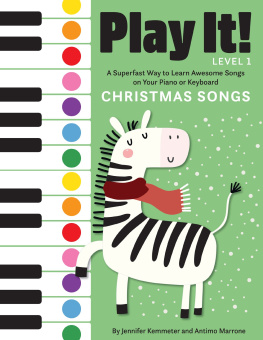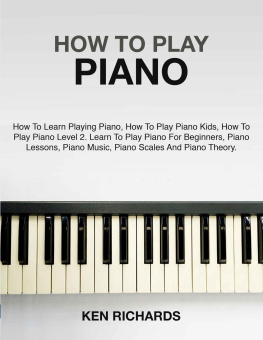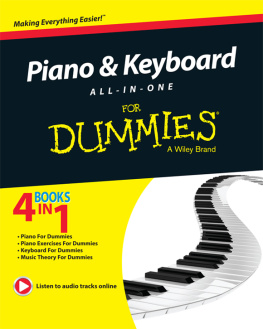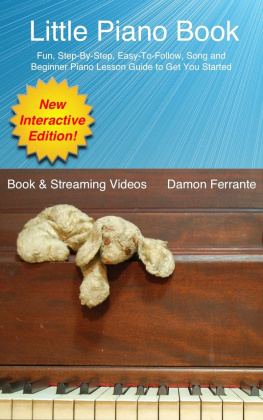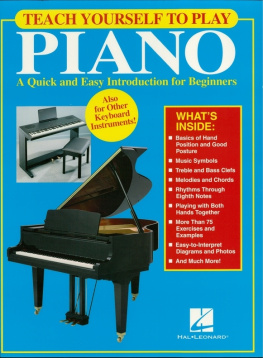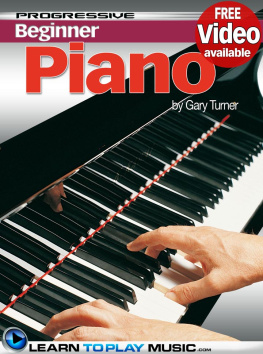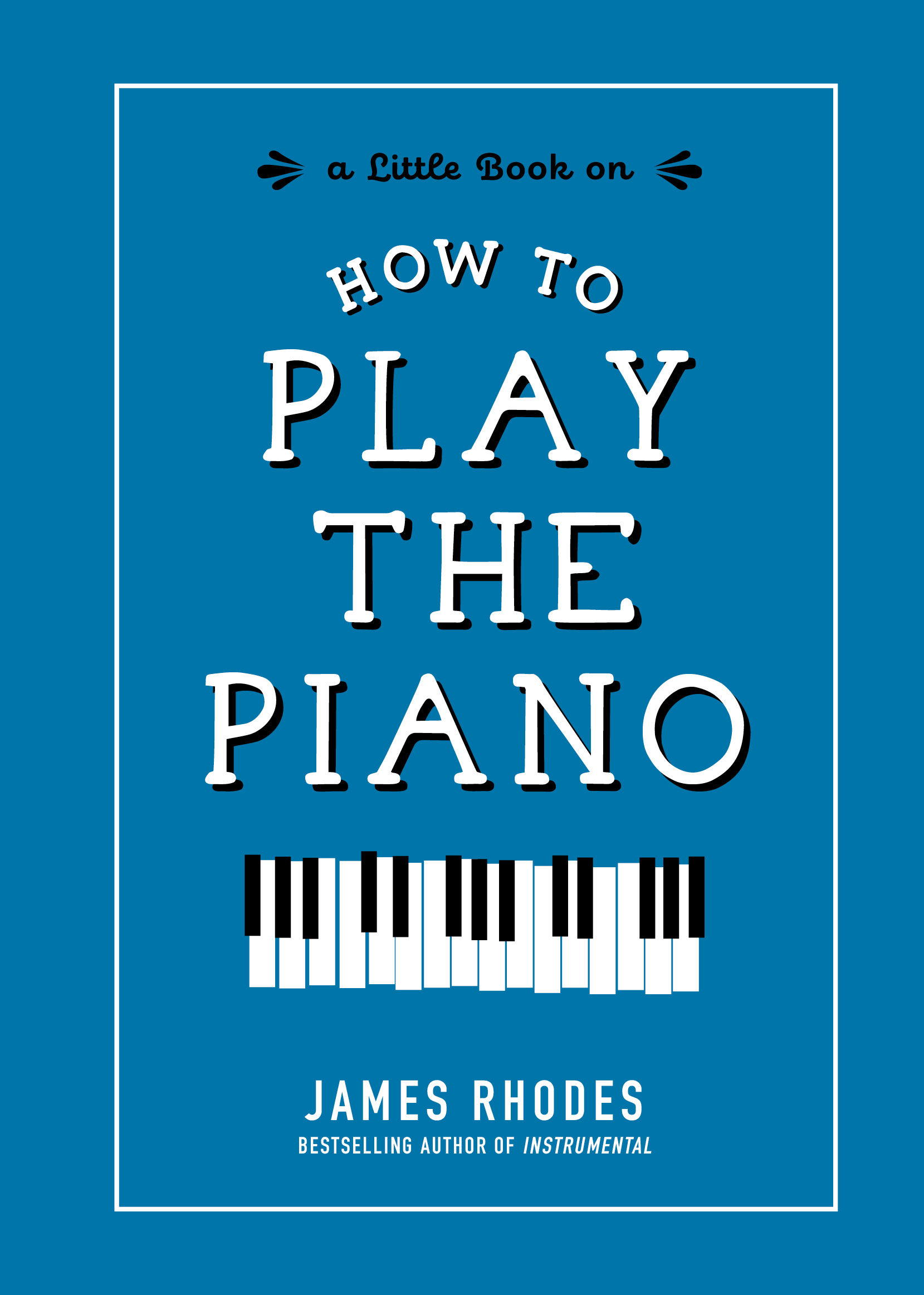

Chapter 5
What happens now?
L ets finish by taking a moment to notice how far you have come.
You should now be able to play the piece through from beginning to end, maybe even from memory. You have an idea in your mind about what it should sound like and what you want it to sound like, and you can, using the pedal, your own innate musicality, and slow practice, translate that idea into reality. You can perform this piece in
its entirety.
In the space of a few short weeks, through dedication, focus, and hard work, you have gone from barely playing a note to performing Bach on the piano. Its an astonishing, epic, magnificent achievement.
Think about what that means. Instead of showing your friends the 1,000 photos you took on your last holiday in Sicily, or spending hours spiralizing zucchinis and carrots for a dinner party, you can play them this piece!
A quick word about nerves. You may find, when playing the piano for other people, that it feels different from playing it for yourself; dry mouth, shaking hands, that annoying inner voice saying youre going to mess it up. This is entirely, irritatingly normal. This happens to me frequently on stage. The way around it is by accepting fully that you know this piece. You have spent weeks working on ityou have studied every single noteand you can, without a doubt, play it. So if, when it comes to performing it for someone or a small group of friends, you feel nervous, simply look at it as if you are going to do something effortless like watching a movie together or taking a walk. You wouldnt get nervous about those things, youd enjoy them and look forward to them. Same applies herethere is no need for nervesyou can simply have fun doing something that is as easy to you as meeting a couple of friends for dinner somewhere. The more you look at it from this perspective, the easier it will be to perform. Its remarkable how we can train the mind not to unravel (sometimes).
Maybe youll want to upload your performance to YouTube. Feel free to send it to me on Twitter, or simply bask in the fact that youve done something extraordinary. Perhaps youll want to learn Beethoven next; for example, the first movement of the Moonlight Sonata, or Chopins Prelude No. 4 in E minor. You might want to find a decent piano teacher and move forward with them, exploring the piano on a deeper level. Or maybe youve done what you set out to do, and thats good enough. Either way, I wish you well and am so happy youve taken such a brave and brilliant first step back into creativity. Perhaps one day Ill be lucky enough to see you perform.
Bach himself said, Its easy to play any musical instrument: all you have to do is touch the right key at the right time and the instrument will play itself. And, while he was perhaps (OK, definitely) being a bit obtuse, you are now, through your own hard work, able to touch the right key at the right time. What a brilliant thing to have accomplished.
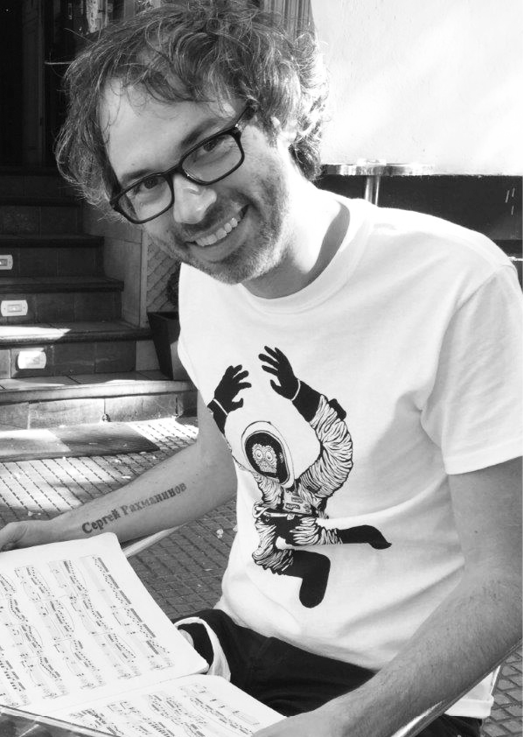
JAMES RHODES was born in London in 1975. A keen piano player, at eighteen he was offered a scholarship at the Guildhall School of Music and Drama, but went to Edinburgh University instead. James stopped playing the piano entirely and dropped out after a year. He ended up working in the City of London for five years. After a devastating mental breakdown that led him to be institutionalized, he took the piano up again. He is now a professional and applauded concert pianist, writer, and TV and radio presenter. His memoir, Instrumental, was published to great critical acclaim and became an international bestseller. Visit him at jamesrhodes.tv.
Also by James Rhodes
Fire on All Sides
Instrumental
Others in The Experiments A Little Book On series
How to Land a Plane
by Mark Vanhoenacker

HOW TO PLAY THE PIANO
Copyright James Rhodes 2016, 2019
Originally published in the UK by Quercus in 2016.
First published in North America by The Experiment, LLC, in 2019.
The moral right of James Rhodes to be identified as the author of this work has been asserted in accordance with the Copyright, Designs, and Patents Act, 1988.
All rights reserved. Except for brief passages quoted in newspaper, magazine, radio, television, or online reviews, no portion of this book may be reproduced, distributed, or transmitted in any form or by any means, electronic or mechanical, including photocopying, recording, or information storage or retrieval system, without the prior written permission of the publisher.
The Experiment, LLC
220 East 23rd Street, Suite 600
New York, NY 10010-4658
theexperimentpublishing.com
Many of the designations used by manufacturers and sellers to distinguish their products are claimed as trademarks. Where those designations appear in this book and The Experiment was aware of a trademark claim, the designations have been capitalized.
The Experiments books are available at special discounts when purchased in bulk for premiums and sales promotions as well as for fund-raising or educational use. For details, contact us at .
Library of Congress Cataloging-in-Publication Data
Names: Rhodes, James, 1975- author.
Title: How to play the piano / James Rhodes.
Description: New York, NY : The Experiment, 2019.
Identifiers: LCCN 2018056926 (print) | LCCN 2018057188 (ebook) | ISBN
9781615195497 (ebook) | ISBN 9781615195480 (cloth)
Subjects: LCSH: Piano--Instruction and study. | Bach, Johann Sebastian,
1685-1750. Wohltemperierte Klavier, 1. T. Nr. 1.
Classification: LCC MT247.B18 (ebook) | LCC MT247.B18 R56 2019 (print) | DDC
786.2/193--dc23
LC record available at https://lccn.loc.gov/2018056926
ISBN 978-1-61519-548-0
Ebook ISBN 978-1-61519-549-7
Cover and text design by Beth Bugler
Author photograph by Jan Mart Cervera | Illustrations by Amber Anderson
Manufactured in China
First printing April 2019
10 9 8 7 6 5 4 3 2 1

Chapter 1
Why do this?
L earning a musical instrument can unlock the door to a new dimension that many of us have forgotten even exists. If listening to music is soothing for the soul, then playing music is achieving enlightenment. Its going from kicking a ball around in the park with a few pals to playing alongside Ronaldo.
Im going to make you a promise: This book will give you all the tools necessary to have you playing a piano masterpiece by Johann Sebastian Bach within six weeks. All you need are two hands; one, or preferably two, eyes; this book; and access to a piano or an electric keyboard. If its a keyboard, then make sure it has at least a four-octave range and a sustain pedal (most of them will have this). You can get one online for under $60. Or you can buy a $100,000 Steinway grand. I leave it to you, although if you do have that kind of cash to spare, congratulations. And perhaps youll invite me around to play with your shiny new piano.
Cooler yet, you only need to find forty-five minutes practicing time a day. Bearing in mind the average professional musician practices four to six hours a day, youre getting off pretty lightly. Plus you can have one day off a week. Sounds achievable, no?
Next page

